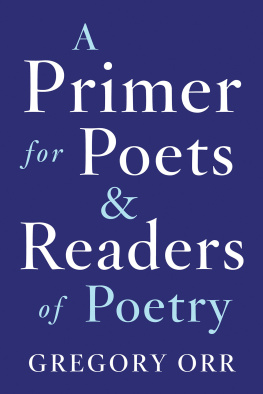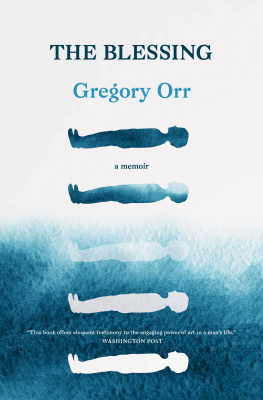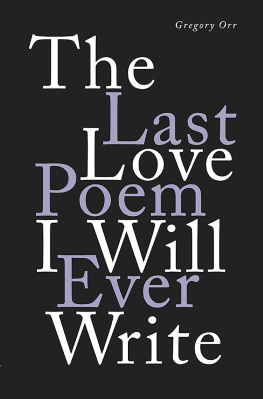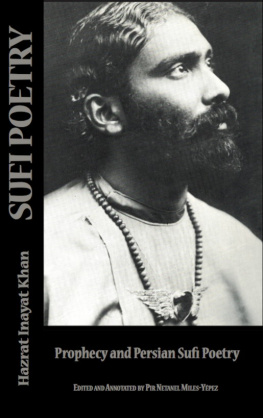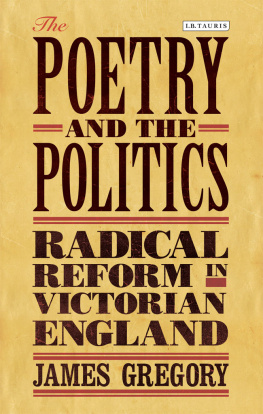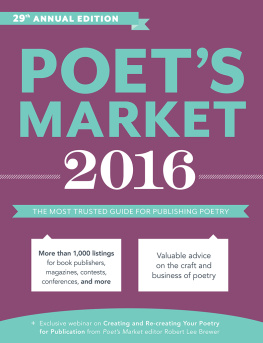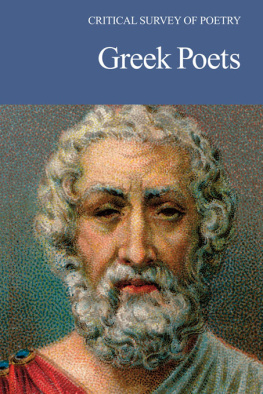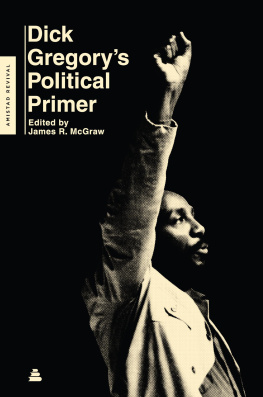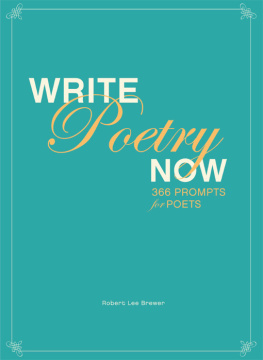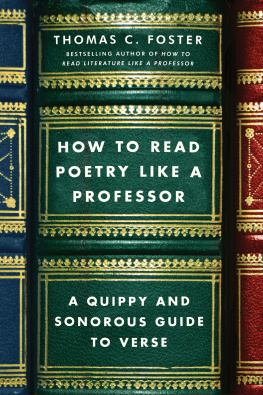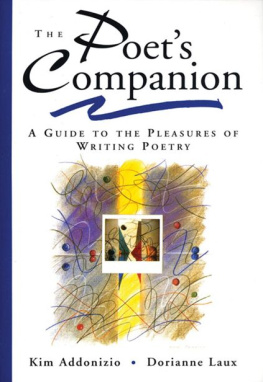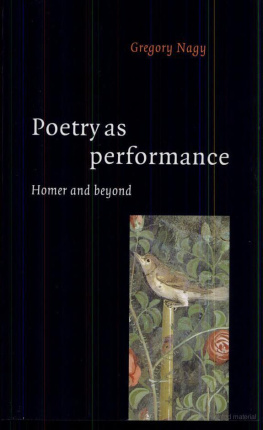Gregory Orr - A Primer for Poets and Readers of Poetry
Here you can read online Gregory Orr - A Primer for Poets and Readers of Poetry full text of the book (entire story) in english for free. Download pdf and epub, get meaning, cover and reviews about this ebook. year: 2017, publisher: W. W. Norton & Company, genre: Romance novel. Description of the work, (preface) as well as reviews are available. Best literature library LitArk.com created for fans of good reading and offers a wide selection of genres:
Romance novel
Science fiction
Adventure
Detective
Science
History
Home and family
Prose
Art
Politics
Computer
Non-fiction
Religion
Business
Children
Humor
Choose a favorite category and find really read worthwhile books. Enjoy immersion in the world of imagination, feel the emotions of the characters or learn something new for yourself, make an fascinating discovery.
- Book:A Primer for Poets and Readers of Poetry
- Author:
- Publisher:W. W. Norton & Company
- Genre:
- Year:2017
- Rating:3 / 5
- Favourites:Add to favourites
- Your mark:
- 60
- 1
- 2
- 3
- 4
- 5
A Primer for Poets and Readers of Poetry: summary, description and annotation
We offer to read an annotation, description, summary or preface (depends on what the author of the book "A Primer for Poets and Readers of Poetry" wrote himself). If you haven't found the necessary information about the book — write in the comments, we will try to find it.
A Primer for Poets and Readers of Poetry — read online for free the complete book (whole text) full work
Below is the text of the book, divided by pages. System saving the place of the last page read, allows you to conveniently read the book "A Primer for Poets and Readers of Poetry" online for free, without having to search again every time where you left off. Put a bookmark, and you can go to the page where you finished reading at any time.
Font size:
Interval:
Bookmark:

A
Primer
for Poets
&
Readers
of Poetry
GREGORY ORR

Adjusting type size may change line breaks. Landscape mode may help to preserve line breaks.
For Trisha
Contents
Adjusting type size may change line breaks. Landscape mode may help to preserve line breaks.
(To a poetic student and friend.) I only seek to put you in rapport. Your own brain, heart, evolution, must not only understand the matter, but largely supply it.
W ALT W HITMAN , After Trying a Certain Book
I ve spent my life reading and writing poetry and teaching both the reading and the writing of it. In putting together this book, I asked myself what I would have liked to know when I was a young poet. What would have been useful or interesting to me back then? What could have helped me grow as a poet by deepening my excitement about, appreciation of, and understanding of this curious and compelling art?
This small book represents one poets informal exploration of language and self in relation to the impulse to write lyric poetry. I think of it as a series of brief provocations presented in the hope that they will lead the young poet or reader toward an active response of his or her own. If it encourages you to write poems, or if it clarifies your personal engagement with and excitement about poetry, then it will have succeeded. Inevitably, this book bears the stamp of my own interests and preoccupationsprobably even where I imagine myself to be least personal or biased. Im not trying to convert anyone to my ideas or preoccupations, but only to share them and to articulate what I find to be wonderful and urgent about poetry. I think its preferable for young poets or readers to have a set of ideas and observations to orient them at the outset, rather than muddling their way into something as complex (or simple) as poetry. If any of my ideas strike you as wrong or not true to your experience, thats fine. You, the reader, are invited to make use of anything that seems worthwhile and to discard the rest. But to do eitherto assimilate or rejectis to become what Ralph Waldo Emerson calls an active soul, and that is essential if you wish to engage poetry.
Poetry resists logical progressions and insists on clusters of relationships. Ive done my best to organize this book under brief topics and made some attempt to present them in a sensible order. That said, readers should feel free to investigate any topics that interest them in whatever order they choose. Ive also periodically suggested certain activities a reader might do to directly experience some notion in the text; for lack of a better word, Ive called them exercises. If, in responding to any of these exercises, you write something that so engages you that you work on it to the point of considering it a poem of your own, then thats all to the good. But it isnt essential that the exercises lead to full-blown poems. Rather, they should be approached in the spirit of experiment and fun.

When starting out in poetry, its often the case (as it was for me) that the urge to write poems is stronger than the urge to read them. That said, sooner or later you have to read lots of poems in order to develop as a poet. The more poems you read, the more you realize the various and amazing things that poets can do with language. But I dont intend this book to be an anthology, and I dont reproduce many complete poems in it. Throughout, I suggest a number of poems by title and author; if youre curious and have access to the Internet (todays global library), youll probably be able to find them and read them to see if they are useful or interesting to you. Likewise, in the early stages of your growth as a writer or reader of poetry, teachers and peers will happily guide you to poems that they find exciting and worthwhile. Quite possibly, you are using this primer in a class alongside an anthology chosen by your teacher, who will enthusiastically present the poems she or he most admires. Thats as it should be. Its how most of us entered the world of poetry as young writersguided by the enthusiasms and insights of our first teachers. But ultimately, each poet must find his or her own way to grow authenticallyat least partly through reading poems. Perhaps one poem or poet that you love will lead you to anotheryoull become aware of influences and shared preoccupations of style or contentand soon youll be finding on your own those poems through which you can develop a clearer sense of your own identity as poet and person. I hope this book encourages that very important and brave purpose.

This primer is, as all texts must be, a reflection of the attitudes and biases of its author. In it, you will find very little discussion of traditional forms. For example, I say nothing much about sonnets, though some of my favorite poems are sonnets; nor villanelles, though Ive written almost a dozen myself. I admire both forms, but I think their study should come later in a poets growth, and only if those particular forms attract you. Of course, if youre studying with a teacher who has the desire and ability to teach how to write those forms, thats all to the good. If I neglect the traditional forms, I say even less about so-called experimental poetries. My reasons for neglecting experimental poetries are more deeply rooted: in my experience, most poets are eager to connect words to both the world around them and the worlds inside them, and to do so in terms of understandable themes and experiences. Certain experimental poetries are based on severing the bond between Word and World; while this can be exhilarating for a while, I feel it is a flirtation with alienation and isolation that ultimately undermines the social purpose of language, which is to connect us to the world of our experience and to each other.
While Im listing my sins of neglect and omission, I should add that I havent a lot to say about meter and metrical scansion of poems. Although traditional meters are a profoundly honorable form of ordering language in poetry, I find the topic to be more intimidating than welcoming to young poets and readers. Whats more, I think an early preoccupation with meter can distract from what I consider to be the central project: the encouragement of intelligent and engaged self-expression. If you feel otherwise, I urge you to continue your studies in these directions, either on your own or under the guidance of a more experienced poet-teacher.
Were I to continue this list of the shortcomings or omissions of my primer, I could hardly expect you to have enough curiosity to give it a chance, so Ill stop now and wish you well on this most exciting of adventures: the expressive joy of writing poems.
I n many ways, lyric poetry is the simplest and most obvious thing in the cultural world. Youll notice that I say lyric poetry. I dont have much to say about epic poetry, or even extended narrative poetry. Lyric poetry is the most basic and omnipresent form of poetry. Not only that, but ever since the romantic period lyric has been the dominant form of poetry in the West. Once you realize that lyric poetry includes popular song, its obvious that it is at the center of human emotional life as it seeks expression in words. Who among us could imagine growing up without some form of popular musicsongs whose lyrics express the inner life of the self and its responses to the world and to other people? In America, this could be rock n roll, hip-hop, blues, country, folk, rap, or emo. Why should it matter what kind of music we personally respond to? It all has the same purpose: to dramatize human experience and to emphasize its subjective dimension. Although the lyrics of popular song are poetryan opinion I find powerfully validated by the recent award of the Nobel Prize in Literature to Bob Dylanlanguage in song is seldom as well organized and carefully constructed as the language of poems written for the page. After all, so much of the energy and emotion of song is carried by melody, instrumentation, and vocal performance. What unites lyric poetry and popular song isnt the quality of language use, but its expressive purpose.
Next pageFont size:
Interval:
Bookmark:
Similar books «A Primer for Poets and Readers of Poetry»
Look at similar books to A Primer for Poets and Readers of Poetry. We have selected literature similar in name and meaning in the hope of providing readers with more options to find new, interesting, not yet read works.
Discussion, reviews of the book A Primer for Poets and Readers of Poetry and just readers' own opinions. Leave your comments, write what you think about the work, its meaning or the main characters. Specify what exactly you liked and what you didn't like, and why you think so.

